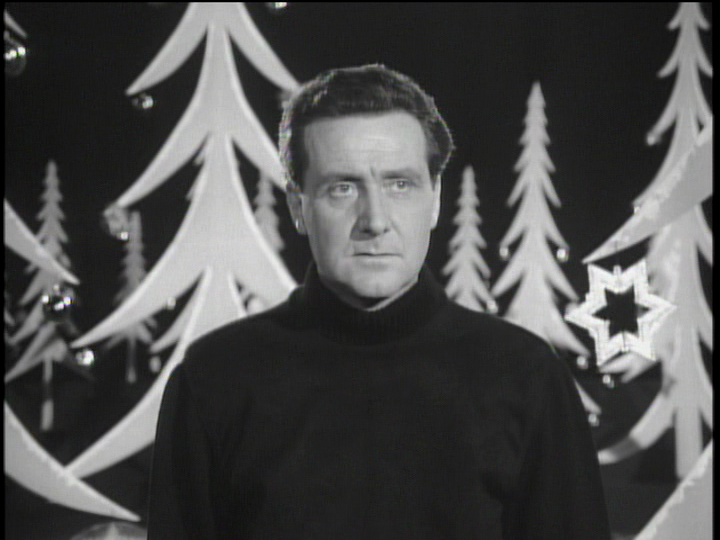
CINE-MAS 2015
here comes a chopper to chop off your head:
THE AVENGERS, S.4 E.13
Holiday-themed movies have become as intrinsic a part of the season as getting drunk on eggnog and passing out under the mistletoe while relatives sneak awkwardly out the door.
But does a film necessarily have to include persecuted Santas and suicide-preventing angels to be a true "Christmas classic?" Before you slip in your well-worn copy of The Bells of Saint Mary's or Jingle All the Way, consider some titles from The Pink Smoke's alternative list of movies that touch on the most wonderful time of the year (to varying degrees.)
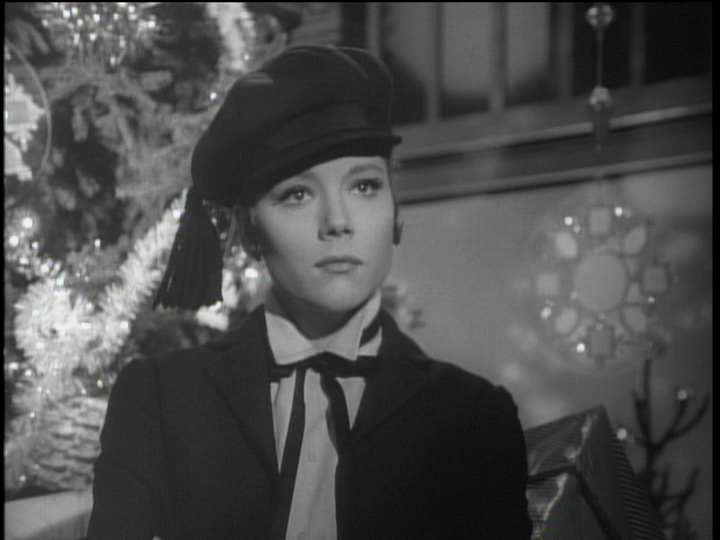
TOO MANY CHRISTMAS TREES
roy ward baker, 1965
~ by john b. cribbs ~
The British are crackers about Christmas.
(That's a little joke for our U.K. audience. Hope you enjoyed it, sir.)
Of course, pop culture-wise, the English boast the best Christmas story ever told that doesn't include a leg lamp. Charles Dickens' 1843 novella A Christmas Carol is second only to the Nativity as the single most cherished holiday narrative, having been turned into at least 20 films, ten times as many TV, theatrical and radio adaptations, even a handful of operas (not to mention the countless parodies and pastiches). Moreso, the ubiquity of the phrase "Merry Christmas" has been traced to the popularity of Dickens' book, which spurred a mid-Victorian revival of the holiday upon publication. The tale of Ebenezer Scrooge and his three spirits is inescapable come Christmastime in the states and practically worshipped in its home country. So when the producers of The Avengers elected to film a Christmas-based episode of their inimitable sci fi-espionage parody series, it's hardly surprising they decided to tackle Dickens head-on, albeit with an adventure involving telepathic invasion that features a climatic shootout with Santa in a hall of mirrors.
"Too Many Christmas Trees," a favorite of star Patrick Macnee (who passed away in June at 93), originally aired 50 years ago, December 25, 1965.* Earlier that summer, the BBC had been involved in one of their most infamous controversies: the decision to withdraw its airing of The War Game, Peter Watkins' fictional documentary depicting a nuclear war against Britian, on the anthology series Wednesday Play. Apparently BBC top brass had deemed it "too horrifying" to broadcast - which is probably fair considering it focsed on the merciless governmental repression of survivors in a post-apocalyptic wasteland. The final scene of the film depicts a gathering in a bombed-out church on the first Christmas Day following the war, complete with "Silent Night" playing over the final credits, but there's no getting around what a downer the film was. (Watkins' entirely fictional film would, absurdly, go on to win the 1966 Academy Award for Documentary Feature - he called it a "staged documentary.")
"Too Many Christmas Trees," too, is decidedly unsentimental. Although it's a lot of fun (especially in comparison to, you know, The War Game) and filled with as many perky moments as any episode (notably there's a cheeky in-joke mentioning Cathy Gale, the character Honor Blackman played before leaving the series to star in Goldfinger, being "in Fort Knox"), it's also one of the more brooding and tense outings for posh spy duo John Steed and Emma Peel. It opens with a Christmas nightmare: Steed is wandering through a field of false Christmas trees in his pajamas to the perpetual sound of sleigh bells, with an ominous oboe score looming underneath. He's gleeful at the discovery of a cache of imposingly oversized presents, but taken aback when his gift turns out to be a picture of himself, which morphs into a mirror in which he's joined by the reflection of a man wearing a deranged-looking Father Christmas mask. The mock-Claus directs Steed to a pair of stuffed stockings - they too transform, into the feet of a dead man, prompting delighted laughter from the sadistic Santa.
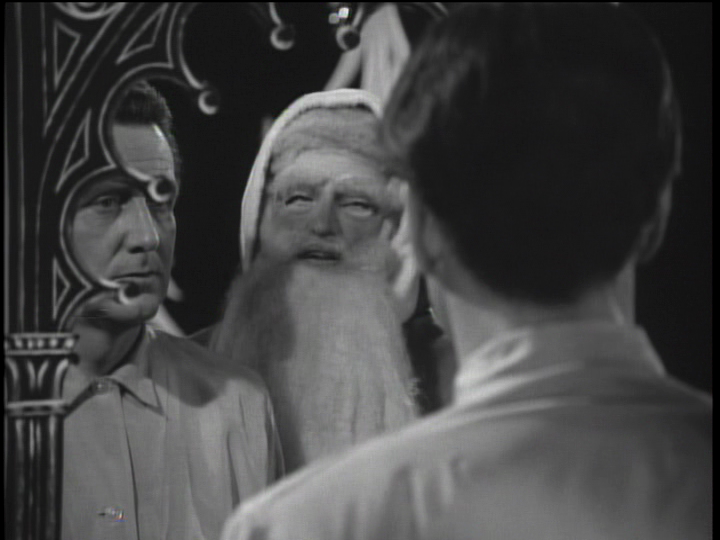
The nightmare is an effectively disorienting way to start things off. It resembles the surreal production of the Salvador Dali-designed dream sequence in Spellbound; indeed, the entire episode has a great cinematic quality. It was the first of 8 episodes directed by Roy Ward Baker, who'd cut his teeth in Hollywood directing films such as the noir Don't Bother to Knock and disaster movie A Night to Remember (he'd go on to direct Quatermass and the Pit, given the excellent US title Five Million Years to Earth, and a bunch of beloved early-70's UK horror movies). When Steed's dream picks up in another scene he finds himself being carted via cardboard tumbrel to a very real-looking guillotine with Santa standing in as the head collector. There's an excellent use of slow motion here, the blade falling interminably as Steed finds himself helplessly awaiting its connection with his exposed neck (he later describes it as, "Swish - no head, no bowler!")
That the latter phantasm would be specifically inspired by A Tale of Two Cities turns out not to be a coincidence. Mrs. Peel has been invited to a Dickens-themed holiday party at the estate of Brandon Storey, a publisher who's so keen on the author that Dickens busts line the hallways, the bedrooms are all modeled on his books (Steed is settled in the Old Curiosity Shop) and guests are issued costumes so they can attend the party in the guises of characters like Uriah Heep and Martin Chuzzlewit. While Diane Rigg is cute as hell dressed in form-fitting drag as Oliver Twist, Steed is perturbed to find he's been assigned the role of Sydney Carlton, as prophesied in his nightly visions.
Sure enough, his head has been targeted by a league of sherry-sipping villains circled around a table decorated with hexagrams, photographs of Steed and a metronome, its pendulum swinging portentously. The series finds one of its more memorable baddies in Janice Crane (Czech actress Jeanette Sterke), a telepath with extra-sensory perception whose occult powers are enlisted to pull government secrets out of Steed's mind. Crane's brain invasion tactics have already claimed one victim (the dead man in Steed's dream, a fellow operative) whose death the group unconvincingly claim was a coincidence. They set their sites on Steed, who has a reputation as a "pretty tough nut," and plan to soften him up with surreal sugarplum fantasies which serve as the "last wave of shock troops before the final assault." In a magnificently-edited sequence, Crane has Steed volunteer for a psychic parlor game for the benefit of other party guests only to break down his mental defenses and force him to succumb to her seductive thrall; a suspicious Peel breaks the trance by shattering her champagne glass. It's as tense a moment as when Steed is surrounded by members of the Hellfire Club, tasked with removing a pea from the line of a dropping axe without losing any fingers in the classic "A Touch of Brimstone."
I love Avengers episodes where the writers play up Peel's education, and this one allows her to put her background in psychology to good use. Although she initially diagnoses Steed's nightmares as "childhood regression" harking back to when he was a child and learned there was no Santa (he blames it on a hangover from half a bottle of claret), she quickly begins to suspect that he may be having a mental breakdown. Steed has to admit that he's "going potty" (not like that - it's slang for going nuts) - the first dream so disquiets him that he begrudgingly opts for an electric over a straight razor. In the episode's funniest moment, the suggestion that Steed is going dangerously over-the-edge is followed by a pan to the subject himself holding up a nasty-looking carving fork and smiling giddily. Emma dutifully plays the doting mother, bringing over groceries to cheer Steed up (cavier, quail's eggs, asparaghus, and cheese - of all things, Emma doesn't approve of the dairy), but helps out more by investigating what's going on behind the scenes of the party. She also gets plenty to do action-wise, including a nice tumbling kick off a chair, bagging herself an evil butler and karating** the hell out of the nightmare Santa himself. Rigg is fantastic as usual and gets lots to do in the episode.
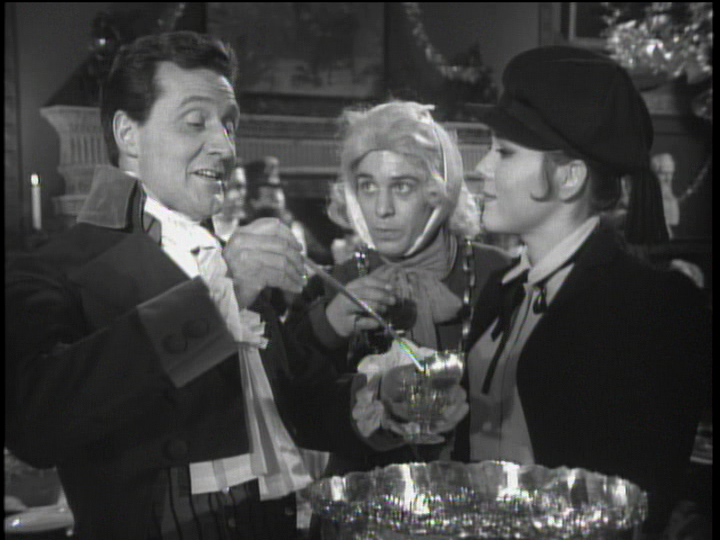
Meanwhile Macnee plays a more vulnerable version of Steed, trying his best to keep up the witticisms and maintain his unruffled carriage while being confronted with elements from his unsettling dreams in real life. His apprehension plays into what made The Avengers such an intriguing show: it never let up on its lighthearted tone, even when entire episodes were seeped in constant dread. Unable to rely on his playful Steed-ishness, our hero has to self-regress to a childlike state to block his mind from Crane's control, loudly singing the Christmas carol "Green Grow the Rushes, O" (brought in on his ruse, Peel joins him in the nursery song "Oranges and Lemons").
Having successfully obstructed the cerebral trespassers, the pair are free to dispatch their foes in a firefight set in a hall of mirrors (not sure which Dickens this room is meant to resemble - the mirrors in the courtroom at the London trial of Charles Darnay in Tale of Two Cities?) ending with Steed capping St. Nick. The deranged Santa turns out to be Brandon Storey, the Dickens-obsessed host, and Mrs. Peel's emotional outburst at the discovery turns out to be the result of a tear gas-releasing pen Steed had given her as a Christmas present having broken in her pocket during the melee. The two agents have a lovely cry together and end the episode riding together in a horse-drawn coach. (Steeds produces some mistletoe, but keeping with the satisfying sexual tension between them we cut out before any indication of a holiday smooch.)
To solidify its Dickens connection, the casting of the episode ties it directly to Renown Studios' seminal 1951 version of A Christmas Carol (technically titled Scrooge) starring the vastly enjoyable Alastir Sim (I like him, Truffaut!) Appearing in that film was Patrick Macnee, making one of his earliest appearances as young Jacob Marley in the "Ghost of Christmas Past" section. Even more prominent was Mervyn Johns, playing non-union clark Bob Cratchit, who plays head baddie/Dickensphile Brandon Storey in "Too Many Christmas Trees." Further links include Steed describing his colleague as "dead as a doornail" in his dream and Peel discovering the cobwebbed body of a victim, eyes open, dressed as Jacob Marley in the hall of Great Expectations.
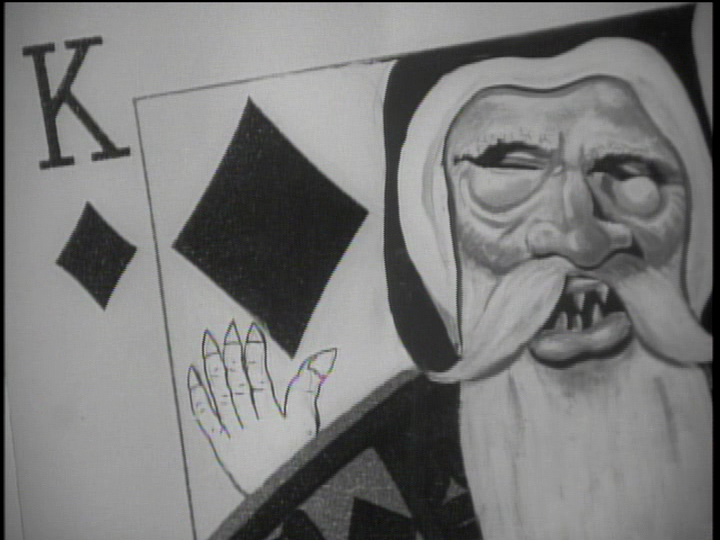
But moreso the Avengers episode shares with the film an unapparent cynical view of the holiday. Watching the '51 Christmas Carol this season, it struck me how what most of the "good" characters and the first two spirits are imploring from Scrooge is the simple acknowledgment that Christmas is a time when "want is most keenly felt." It's not just about turning a miserly old curmudgeon into a cheerful Christmas enthusiast, it's about getting him to understand that, for most people, the holidays are super-depressing; that the rampant delight that surrounds them is soul-crushing for those who for whatever reason can't obtain the familial, economical or spiritual comfort and joy that so many others revel in. Even for those who do obtain it, Christmas is still a remarkable facade veiling internal as well as external conflicts that don't actually stop existing for the last two weeks of December. Steed has to recede to behaving like an idiot child, the ideal state for one to enjoy Christmas, to fend off the psychological attack of his intruders.
Having triumphed on Christmas Day, the emotions that apparently overwhelm Mrs. Peel turn out to be the product of a tear gas-releasing pen in her pocket. The creepiest part of the episode comes when a steely-faced Steed opens a Christmas card from his enemies, with a rendition of images from his dreams on the front, that's revealed to be blank. Steed's dreams themselves are the ultimate freak-out induced by too much Christmas happiness and too many Christmas trees - it's all surfaces masking a sinister intention that uses the gleam and glamor of the most wonderful time of the year to try and destroy someone. But in that best Avengers tradition, the two ideas - the charm of a traditional English Christmas and the annual veneer of holiday abundance serving as the story's ostensible villain - play off each other beautifully. They kill Santa and ride off in a beautiful horse-drawn sleigh - yay! The end.
I can't help but mention that on the same day this episode aired, over on BBC1 the cast of Doctor Who were running around like hapless clowns in a madcap screwball comedy in "The Feast of Steven," placed smack in the middle of the sprawling 12-part serial The Daleks' Master Plan. The episode is largely goofy as hell, with the Doctor - a being who's traveled through time and space - not understanding that he and his companions have landed on a Hollywood movie set. It has little to do with the rest of the serial's ambitious and very dark storyline, which saw the first-ever death of not one but two heroic companions, and, despite its title,*** even less to do with Christmas. At least until the very end, when star William Hartnell decides to turn directly to the camera as the final seconds tick down to wish "a happy Christmas to all of you at home!", inadvertently sparking decades worth of debate on how to accept this spontaneous burst of fourth-wall breaking merriment as canonical. It's an infamous moment that lives on - through audio, since "Feast of Steven" is one of the 97 episodes of early Doctor Who still missing from the BBC archives due to the company's practice of purging its master tapes; the same fate befell the entire first season of The Avengers, of which only 2 episodes remain fully intact**** - to make Doctor Who fans and historians punch the air in frustration. Personally, I find it absolutely charming and wish it was still an acceptable practice for TV stars to turn toward the camera and wish everyone at home a happy holiday. (Incidentally, the Christmas Special has become a staple of the new era of Doctor Who: David Tennant's Tenth Doctor even made his debut in the second of these.)
~ JANUARY 9, 2016 ~
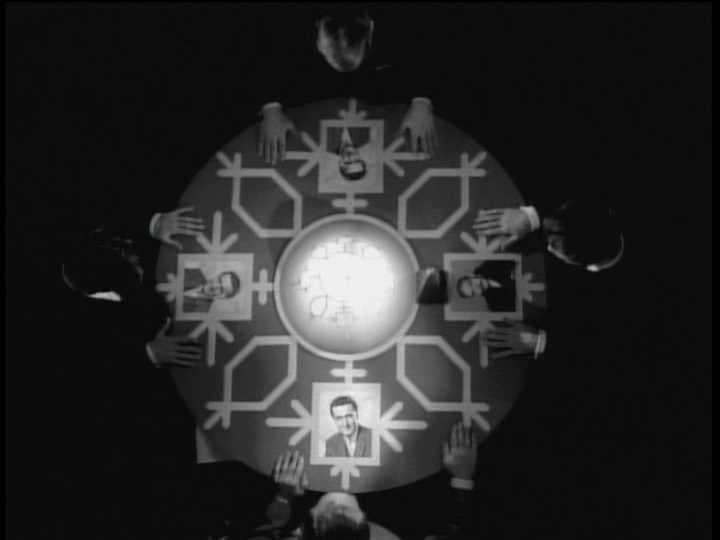
* In America, A Charlie Brown Christmas, that most enduring of Christmas television specials, had premiered on CBS three weeks earlier.
** What? "Karating" is a word. See: Jaws.
***So named because one of the Doctor's companions at the time (the one who ultimately survives the serial) was Peter Purves' Steven Taylor.
**** Producer Sydney Newman spearheaded both The Avengers and Doctor Who.






